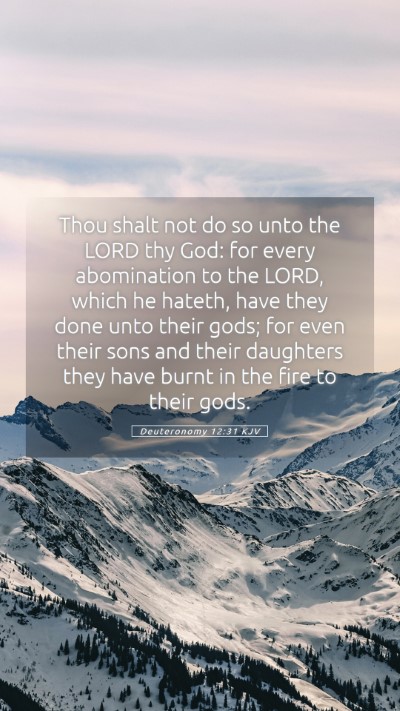Understanding Deuteronomy 12:31
Deuteronomy 12:31 states, "Thou shalt not do so unto the Lord thy God: for every abomination to the Lord, which he hateth, have they done unto their gods; for even their sons and their daughters they have burnt in the fire to their gods." This verse warns against adopting the practices of surrounding nations, particularly those involving idolatry and horrific sacrifices. The text is part of Moses’ exhortation to the Israelites as they prepare to enter the Promised Land, emphasizing their covenantal relationship with God.
Bible Verse Meanings
This scripture encapsulates a fundamental principle in the faith of Israel — the exclusive worship of Yahweh and the rejection of pagan practices. Here are insights from prominent commentaries:
- Matthew Henry's Commentary:
Henry highlights the abominable practices of the idolaters, which included child sacrifices. He emphasizes that God's chosen people must not emulate such behavior. Instead, they are to wholly devote themselves to God, ensuring their worship aligns with His commands.
- Albert Barnes' Notes:
Barnes notes the gravity of the warnings given by Moses. He asserts that the Israelites must not adopt any practice that contradicts their moral and spiritual obligations to God. He emphasizes that their identity as God's people necessitates a clear separation from the worship practices of other nations.
- Adam Clarke's Commentary:
Clarke elaborates on the horrors of the practices mentioned, particularly the sacrifice of children. He points out that such acts are an affront to God’s character and that the resultant judgment on those nations underlines the seriousness of divine justice. Clarke reiterates the expectation for the Israelites to uphold divine holiness in their worship.
Historical Context
The historical backdrop to this verse includes the Canaanite practices that were prevalent during the time of conquest. The Israelites, fresh from slavery in Egypt, were being taught the distinctiveness of their new identity as God's chosen people. Their covenant with God necessitated a strict adherence to worship and morality that set them apart from other cultures that indulged in idolatry.
Theological Implications
The theological concepts within this verse underscore the nature of God as righteous and holy. It suggests that God despises any form of idolatry and the accompanying immoral acts. This verse serves as a reminder of the consequences that follow disobedience to God's commands.
Application to Daily Life
In contemporary life, Deuteronomy 12:31 invites believers to reflect on their spiritual practices and influences, ensuring they do not conform to societal norms that clash with biblical teachings. It calls for an examination of one’s values and choices, aligning them with a commitment to live according to Scripture.
Related Scripture Cross References
- Leviticus 18:21: This verse also addresses the prohibition against child sacrifice.
- Jeremiah 32:35: It discusses God's condemnation of the practices of child sacrifice in Israel.
- 1 Kings 14:24: This highlights how Israel fell into idol worship similar to the surrounding nations.
Conclusion
In summary, Deuteronomy 12:31 serves as a cautionary reminder against the allure of foreign practices that conflict with divine standards. Through a detailed analysis of this scripture, it becomes clear that maintaining fidelity to God is paramount. The insights provided through biblical commentaries elucidate the importance of understanding Scripture and applying its teachings effectively within our lives.


